- Home
- Nick Carter
Temple of Fear Page 6
Temple of Fear Read online
Page 6
Tonaka was standing well back in the shadows cast by the tiny yellow bulb. The waft of her cigarette came to him, acrid and harsh in the cold death smell of the room.
She said: "You see the tattoo?"
He was looking at it. It puzzled him. A small blue figure of Buddha — with knives sticking into it. It was on the left arm, inside, above the elbow.
"I see it," Nick said. "What does it mean?"
"The Society of the Bloody Buddha. His name was Sadanaga. He was Eta, Burakumin. Like myself — and my father. Like millions of us. But the Chinese, the Chicoms, forced him to join the Society and work for them. But Sadanaga was a brave man — he rebelled and worked for us, too. He informed on the Chicoms."
Tonaka flipped away her glowing cigarette butt. "They found out. You see the result. And that, Mr. Carter, is what you will be up against if you help us. And that is only part of it."
Nick stepped back and ran the flashlight over the body again. The mute little wounds gaped at him. He flicked off the light and turned back to the girl. "It looks like the death of a thousand cuts — but I thought that went out with the Ronins."
"The Chinese have brought it back. Updated, in modern form. You will see. My father has a model of the machine they use to — to punish anyone who defies them. Come. It is cold down here."
They went back to the little room where Nick had awakened. The music was still banging and strumming and vibrating. He had somehow lost his wristwatch.
It was, Tonaka told him, a quarter after two.
"I don't feel like sleep," he said. "I might as well cut out right now and go see your father. Call and tell him I'm on my Way."
"He has no phone. It is not wise. But I will get a message to him in time. Perhaps you are right — it is easier to move around Tokyo in the small hours. But wait — if you are going now I must give you this. I know it is not what you are accustomed to — my father remembers — but it is all we have. Weapons are hard to come by for us Eta."
She went to a small cabinet in one corner of the room and knelt before it. The slacks tightened over a smooth line of thigh and buttock, limning the taut flesh.
She came back with a heavy pistol that glinted black with an oily sheen. She handed it to him along with two spare clips. "It is very heavy. I could not use it myself. It has been hidden away since occupation days. I think it is in good condition. I suppose some CI traded it for cigarettes and beer, or a girl."
It was an old Colt .45, 1911. Nick had not fired one for a long time but he was familiar with it. The weapon was notoriously inaccurate at over fifty yards, but within that range it would stop a bull elephant. It had, in fact, been developed to stop amoks in the Philippines.
He released the full clip and pumped the sleeve several times, checked the safeties, then thumbed cartridges onto the bed pad. They lay thick and blunt and deadly, the brass shimmering in the light. Nick checked the feeder springs in all the clips. They would do. Just as the old .45 would have to do — it wasn't Wilhelmina, of course, but then no other gun was. And he could have done with the stiletto, Hugo, nestling along his right arm in the chamois spring sheath, but that was out. He had to use the tools at hand. He jammed the Colt into his waistband and buttoned the trenchcoat over it. It bulged, but not too much.
Tonaka was watching him closely. He sensed her approval in her dark eyes. The girl was, in fact, feeling more optimistic about matters. She knew a professional when she saw one.
She handed him a small leather keyfold. "There is a Datsun in the parking lot behind the San-ai Department store. You know it?"
"I know it." It was a tubular building not far down the Ginza, resembling a massive rocket on its pad.
"Good. Here is the license number." She handed him a slip of paper. "The car may be watched. I don't think so, but it may be. You will just have to take that chance. You know how to get out to the Sanya district?"
"I think so. Take the Freeway to Shawa Dori, then come off and go as far as the baseball stadium. Cut right on Meiji Dori and that should get me somewhere around the Namidabashi Bridge. Right?"
She came closer to him. "Pretty right. You know Tokyo well."
"Not as well as I should, but I can make out. It's like New York — they keep tearing it down and building it again."
Tonaka was closer now, nearly touching him. Her smile was sad. "Not in the Sanya district — that is still slums. You will probably have to leave the car near the bridge and walk in. The streets aren't much."
"I know." He had seen slums the world over. Seen them and smelled them — the dung and the filth and the human garbage. The dogs that ate their own excreta. The babies that would never have a chance and the old waiting to die without dignity. Kunizo Matu, who was Eta, Burakumin, must feel very strongly about his people to return to a place like Sanya to die.
She was in his arms. She pressed her slim body against his big hard one. He was surprised to see tears glistening in the long, almond-shaped eyes.
"Go, then," she told him. "God be with you. I have done all I can, obeyed my honorable father in every detail. You will give him my — my respects?"
Nick held her gently. She was trembling and there was a faint scent of sandalwood about her hair.
"Just your respects? Not your love?"
She would not look at him. She shook her head. "No. Just as — as I say. But do not think of that — it is between my father and me. You and I — we are different." She pulled a little away from him. "I have a promise to keep, Nick. I depend on you to make me do so."
"I will."
He kissed her. Her mouth was fragrant, soft, as moist and yielding as a rosebud. As he had suspected she was not wearing a bra, and he felt the swell of her breasts against him. For the moment they melded, shoulder to knee, and her trembling increased and her breathing roughened. Then she pushed him away. "No! We must not. That is all — come, I will show you how to leave this place. Do not bother to memorize it — you will not be coming back here."
As they were leaving the room a thought struck him. "How about that body?"
"That is our concern. It will not be the first we have disposed of — when the time is right we will put it into the harbor."
Five minutes later Nick Carter felt the light touch of April rain on his face. Hardly more than a mist, really, and it was cool and soothing after the confines of that basement. There was a hint of damp chill in the air and he buttoned the old trenchcoat about his throat.
Tonaka had led him into an alley. Overhead the dark turbid sky reflected the glare of the Ginza's neon lights half a block away. It was late but the street was still swinging. As he walked Nick could smell the two odors he identified with Tokyo — hot noodles and freshly poured concrete. To his right was a desolate flattened expanse where a new basement was being dug. The concrete smell was stronger. The cranes in the pit were like sleeping storks in the rain.
He came to a side street and turned back toward the Ginza itself. He came out a block from the Nichigeki Theater. He paused on the corner and lit a cigarette, inhaling deeply and letting his eyes rove and register the frenetic scene. At nearly three in the morning the Ginza was cooling down a bit, but it was not yet dead. Vehicular traffic had thinned, but mobs of. people still ebbed and flowed up and down that fantastic street. Noodle vendors still piped. Brash music poured from the thousands of bars. Somewhere a samisen twanged softly. A late-running tram clanged past. Over it all, as though the sky was leaking rivulets of color, washed the bright surf of the neon. Tokyo. Brash, brawling, bastard of the West. Spawned by rape of the dignified maiden of the East.
A ricksha went by, the coolie trotting wearily with his head down. A Yank sailor and a cute Japanese girl were in heavy embrace. Nick smiled and tossed his butt away. You hardly ever saw that any more. Rickshas. They were as old-fashioned as clogs, or the kimona and obi. Young Japan was hip — and there were plenty of hippies.
High on his right, just under the clouds, winked the warning light on Tokyo Tower in Shiba park. A
cross the street the bright neon of a Chase Manhattan branch told him, in Japanese and English, that he had a friend. Nick's grin was a little sour. He doubted that C-M was going to be much help in his present situation. He lit a new cigarette and took off. His peripheral vision was excellent and he saw the two neat little cops, blue-uniformed and white-gloved, coming up to his left. They were walking slowly, swinging their batons and talking to each other, casual and harmless enough, but there was no point in taking chances.
Nick went a couple of blocks out of his way, keeping an eye on his back trail. Nothing. He was suddenly very hungry and he stopped at a garishly lit tempura bar and ate a huge dish of vegetables and batter-fried shrimp. He left yen on the stone bar and went out. Nobody was paying him the slightest attention.
He left the Ginza, walked down a side street, and came into the San-ai parking lot from the rear. Sodium lights cast a blue-green haze over the dozen cars there. The black Datsun was where Tonaka had said it would be. He checked the license, twisted the paper into a spill for another cigarette, then got in and drove out of the lot. No lights, no shadow of a following car. So far he appeared to be in the clear.
When he sat the heavy .45 dug into his groin. He put it on the seat beside him.
He drove carefully, keeping well within the 32-kilometer limit until he was on the new Expressway and heading north. Then he stepped it up to 50 kilometers, which was still within the night limit. He obeyed every traffic sign and signal. The rain increased and he rolled up the driver's window nearly to the top. As the little car grew stuffy he could smell the sweat and dirt odor of Pete Fremont's suit. There was little of the crazy Tokyo traffic at this hour and he saw no police cars. He was thankful. If the cops stopped him, even for a routine check, it was going to be a little tough, looking and smelling the' way he did. And there would be the .45 to explain. Nick knew the Tokyo police from past experience. They were tough and efficient — they had also been known to toss a man into the pokey and conveniently forget him for a few days.
He passed Ueno Park on his left. Not far now to the beisubooru Stadium. He decided to leave the car in the parking lot at the Minowa Station on the Joban line and walk into the Sanya district by way of the Namidabashi bridge — in the old days they had executed criminals out here by the bridge.
The little suburban station was dark and deserted in the rain-whimpering night. There was one car in the lot, an old jalopy without tires. Nick locked the Datsun, checked the .45 again and thrust it into his belt. He pulled down the beat-up hat, turned up his collar and started trudging into the dark rain. Somewhere a dog howled wearily, a cry of loneliness and despair in that desolate hour before morning. Nick trudged on. Tonaka had given him the flashlight and now and again he used it. Street signs were haphazard, often missing, but he had a general idea of where he was. going and his sense of direction was keen.
Once across the Namidabashi Bridge he was in Sanya proper. A faint breeze off the Sumida River bore the industrial stench of the factories lining it. Another smell hung heavy and pungent on the dank air — the odor of old dried blood and rotting guts. Slaughter houses. There were a lot of them in Sanya and he recalled that a great many of the Eta, the Burakumin, were employed in killing animals and skinning them. One of the few nasty jobs open to them as a class.
He came to a corner. He must be close now. There was a row of flophouses here. A paper sign, shielded from the weather and lit by an oil lantern, offered a bed for 20 yen. Five cents.
He was the only man awake in this desolation. Gray rain hissed and spattered gently on the ancient trenchcoat. Nick figured that he must be within a block or so of his destination. It didn't mean much because now he had to admit that he was lost. Unless Tonaka had set up the contact, the lead-in man, as she had promised.
"Carter-san?"
A sigh, a whisper, an imagined sound above the weeping of the rain? Nick tensed, put his hand on the cold butt of the .45 and looked around. Nothing. No one.
"Carter-san?"
The voice higher now, reedy, one with the wind. Nick spoke into the night. "Yes. I am Carter-san. Where are you?"
"Over here, Carter-san, between the buildings. Come to the one with the lamp."
Nick eased the Colt out of his belt and slipped it off safety. He walked to where the oil lamp guttered behind the paper sign.
"Here, Carter-san. Look down. Below you."
There was a narrow space between the buildings with three steps leading down. At the foot of the steps a man was crouching beneath a straw rain mat.
Nick halted at the top of the steps. "Can I use a light?"
"For one second only, Carter-san. It is dangerous."
"How do you know I am Carter-san?" Nick whispered.
He could not see the old shoulders shrug beneath the mat, but he guessed at it. "It is a chance I take — but she said you would come. And, if you are Carter-san, I am to direct you to Kunizo Matu. If you are not Carter-san, then you are one of them and you will kill me."
"I am Carter-san. Where is Kunizo Matu?"
He flashed the light down the stairs for an instant. Bright beady eyes reflected the gleam. A wisp of gray hairs, an ancient face seared by time and trouble. He squatted beneath his mat like Time itself. He did not have twenty yen for a bed. Yet he lived, he talked, he helped his people.
Nick doused the light. "Where?"
"Down the stairs, past me, and straight back along the passage. As far as it goes. Be careful of dogs. They sleep here and they are wild and hungry. At the end of this passage there is another passage. Take it to the right — go again as far as you can. It is a large house, larger than you would think, and a red light burns behind the door. Go, Carter-san."
Nick fumbled a crisp bill from Pete Fremont's crummy wallet. He dropped it beneath the mat as he passed. "Thank you, Papa-san. Here is money. Your old bones will lie easier in a bed."
"Arigato, Carter-san."
"Itashimashite!"
Nick went cautiously along the passage, brushing his fingers against the ramshackle houses on either side. The smell was terrible and he stepped into sticky filth. He accidentally kicked a dog, but the creature only whined and crept away.
He made the turn and kept going for what he reckoned was half a block. The shacks closed in on either side, jumbles of tin and paper and old packing crates — anything that could be salvaged or stolen and used to make a home. Now and then he saw a dim light or heard a baby crying. The rain wept for the inhabitants, the batayu buraku, the rag and bone pickers of life. A lean cat spat at Nick and fled into the night.
He saw it then. A dim red glow behind a paper door. Visible only if you were looking for it. He smiled sourly and thought fleetingly of his youth in a midwestern town, where the girls around the Real Silk factory had actually kept red bulbs glowing in the windows.
The rain, caught suddenly by wind, beat a tattoo on the paper door. Nick rapped lightly. He stepped back a pace, a pace to the right, the Colt alert to slam lead into the night. The odd sense of fantasy, of unreality, that had been dogging him since he had been drugged, had gone now. He was all AXEman now. He was Killmaster. And he was working.
The paper door slid back with a little sigh, to be filled by a vast bulk in dim silhouette.
"Nick?"
It was the voice of Kunizo Matu and yet it was not. Not the voice as Nick remembered it from the years. It was an old voice, a sick voice, and it repeated: "Nick?"
"Yes, Kunizo. Nick Carter. I understand that you wanted to see me."
Everything considered, Nick thought, it was probably the understatement of the century.
Chapter 6
The house was dimly lit by paper lanterns. "It is not so much that I follow the old customs," said Kunizo Matu as he led the AXEman into an inner room. "Bad lighting is an asset in this neighborhood. Especially now that I have declared my own private little war on the Chinese Commies. My daughter told you of this?"
"A little," said Nick. "Not too much. She said you would cle
ar up everything. I wish you would. There is a lot that puzzles me."
The room was well proportioned, the furnishings in the Japanese style. Straw mats, a low table on the tatami, flowers on the rice paper wall, soft cushions around the table. On the table were small cups and a bottle of saki.
Matu pointed to a cushion. "You will have to sit on the floor, my old friend. But first — did you bring my medallion? I value it highly and I want it with me when I die." It was a simple statement of fact without sentimentality.
Nick fished the medallion out of a pocket and handed it to him. But for Tonaka he would have forgotten it. She had told him: "The old man will 3sk for it."
Matu took the gold and jade disc and put it away in a table drawer. He sank down across the table from Nick and reached for the saki bottle. "We will not stand on ceremony, my old friend, but there is time for a little drink to remember all the yesterdays. It was good of you to come."
Nick smiled. "I had very little choice, Kunizo. Did she tell you how she and her Girl Scout friends got me here?"
"She told me. She is a most obedient daughter — yet I had not really meant for her to go to such extremes. It may be that I was a little overenthusiastic in my instructions. I merely hoped that she could convince you." He poured saki into the eggshell cups.
Nick Carter shrugged. "She convinced me. Forget it. Kunizo. I would have come anyway, once I understood the seriousness of the matter. It is just that I may have a little trouble explaining things to my boss."
"David Hawk?" Matu handed him a cup of saki.
"You know that?"
Matu nodded and drank saki. He was still built like a sumo wrestler, but now the fat draped him in robes of flabbiness and his features were too sharp. His eyes were deep set, with huge pouches under them, and they burned with fever and with something else that was consuming him.
He nodded again. "I always knew a great deal more than you suspected, Nick. About you and AXE. You knew me as a friend, and as your karate and judo teacher. I was working for Japanese Intelligience."

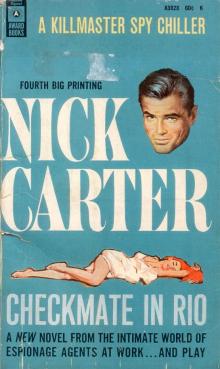 Checkmate in Rio
Checkmate in Rio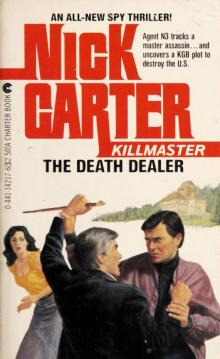 The Death Dealer
The Death Dealer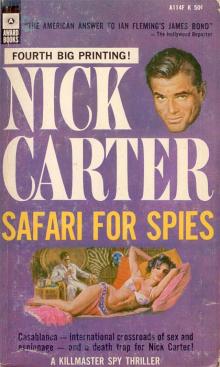 Safari for Spies
Safari for Spies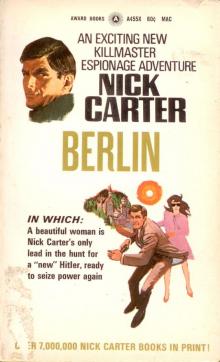 Berlin
Berlin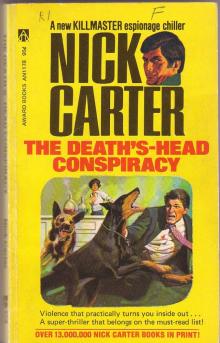 The Death’s Head Conspiracy
The Death’s Head Conspiracy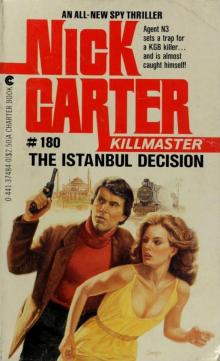 The Istanbul Decision
The Istanbul Decision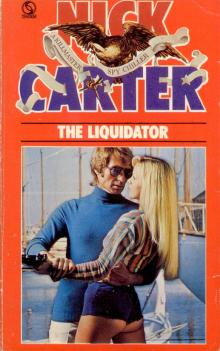 The Liquidator
The Liquidator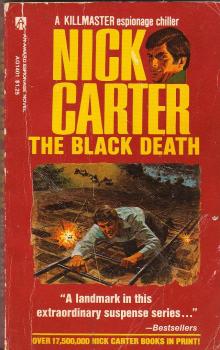 The Black Death
The Black Death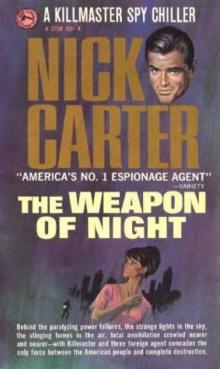 The Weapon of Night
The Weapon of Night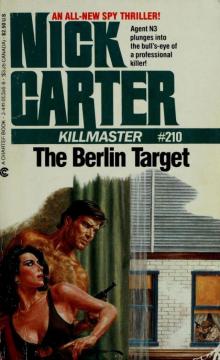 The Berlin Target
The Berlin Target Temple of Fear
Temple of Fear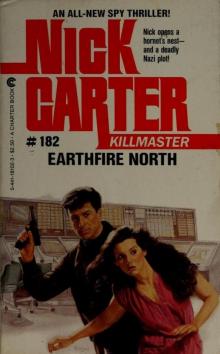 Earthfire North
Earthfire North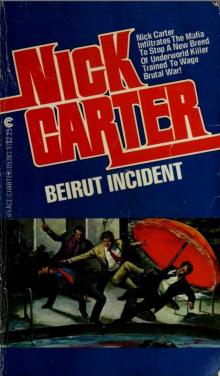 Beirut Incident
Beirut Incident White Death
White Death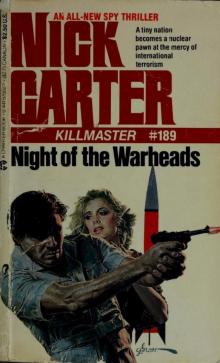 Night of the Warheads
Night of the Warheads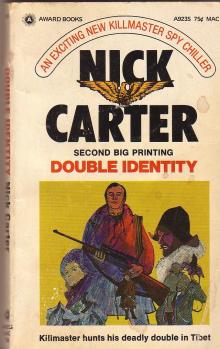 Double Identity
Double Identity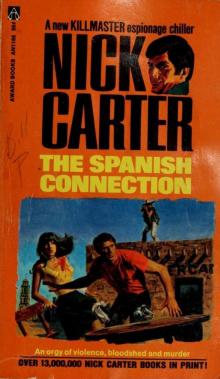 The Spanish Connection
The Spanish Connection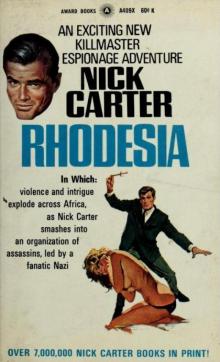 Rhodesia
Rhodesia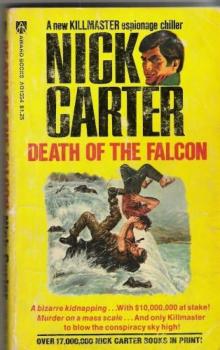 Death of the Falcon
Death of the Falcon The Executioners
The Executioners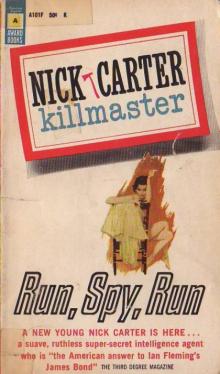 Run, Spy, Run
Run, Spy, Run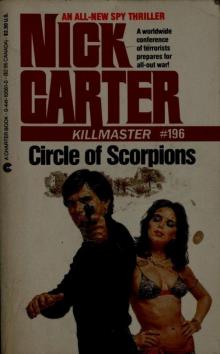 Circle of Scorpions
Circle of Scorpions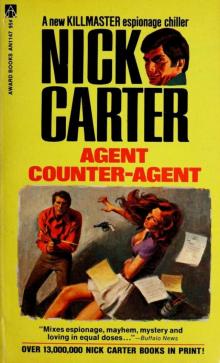 Agent Counter-Agent
Agent Counter-Agent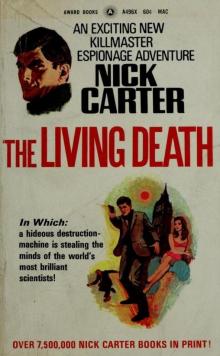 The Living Death
The Living Death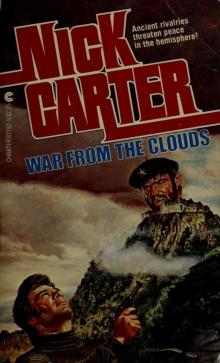 War From The Clouds
War From The Clouds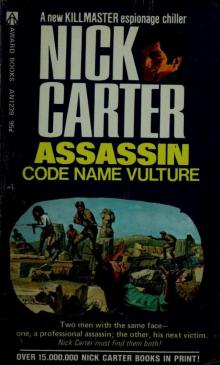 Assassin: Code Name Vulture
Assassin: Code Name Vulture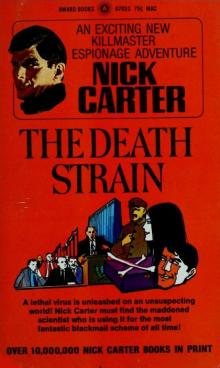 The Death Strain
The Death Strain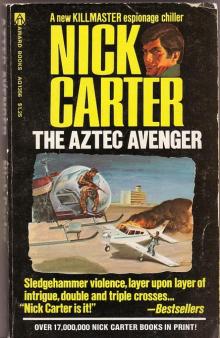 The Aztec Avenger
The Aztec Avenger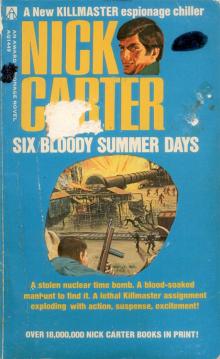 Six Bloody Summer Days
Six Bloody Summer Days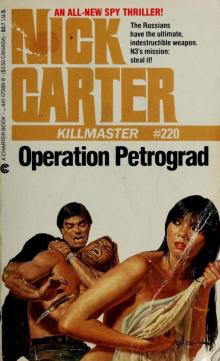 Operation Petrograd
Operation Petrograd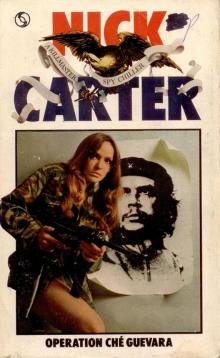 Operation Che Guevara
Operation Che Guevara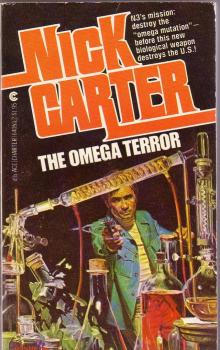 The Omega Terror
The Omega Terror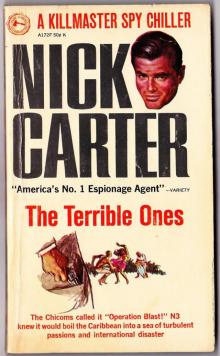 The Terrible Ones
The Terrible Ones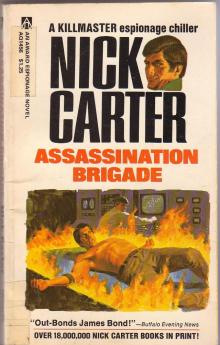 Assassination Brigade
Assassination Brigade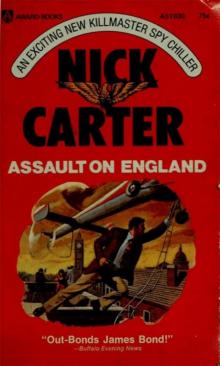 Assault on England
Assault on England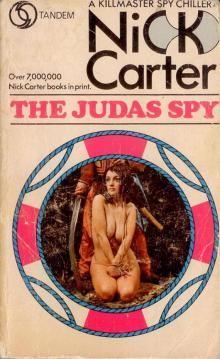 The Judas Spy
The Judas Spy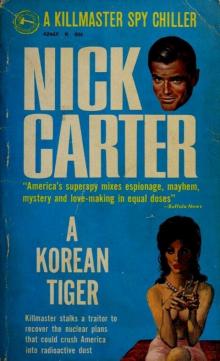 A Korean Tiger
A Korean Tiger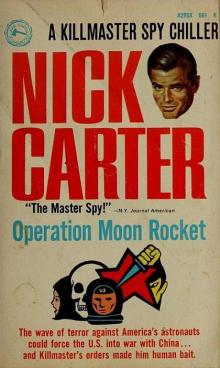 Operation Moon Rocket
Operation Moon Rocket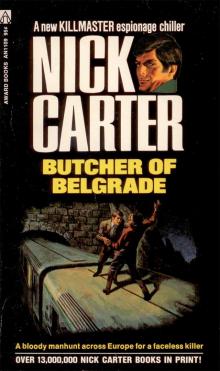 Butcher of Belgrade
Butcher of Belgrade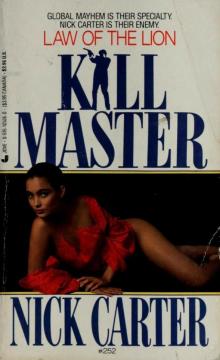 Law of the Lion
Law of the Lion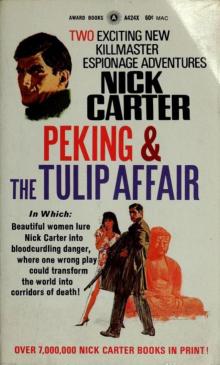 Peking & The Tulip Affair
Peking & The Tulip Affair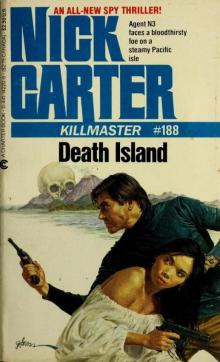 Death Island
Death Island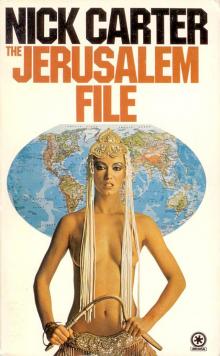 The Jerusalem File
The Jerusalem File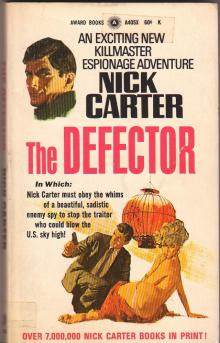 The Defector
The Defector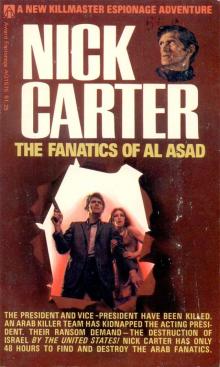 The Fanatics of Al Asad
The Fanatics of Al Asad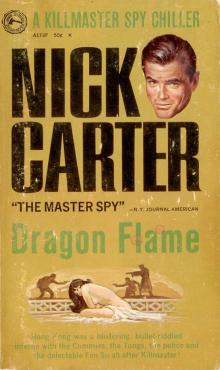 Dragon Flame
Dragon Flame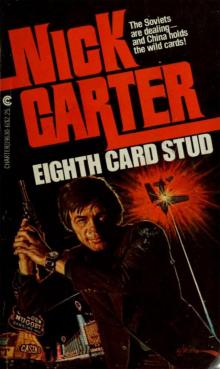 Eighth Card Stud
Eighth Card Stud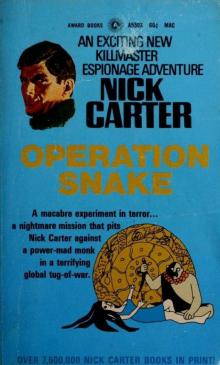 Operation Snake
Operation Snake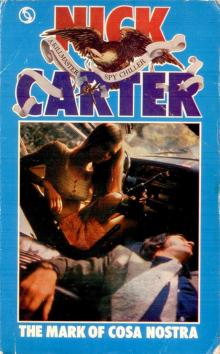 The Mark of Cosa Nostra
The Mark of Cosa Nostra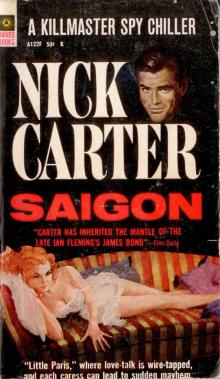 Saigon
Saigon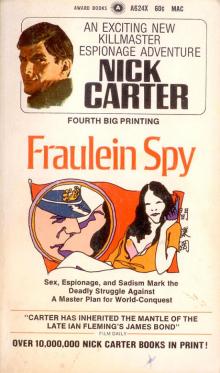 Fraulein Spy
Fraulein Spy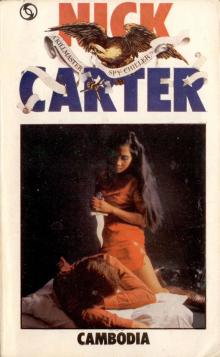 Cambodia
Cambodia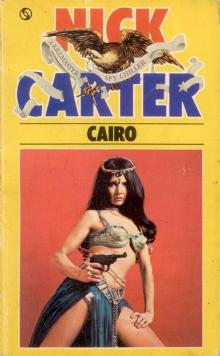 Cairo
Cairo